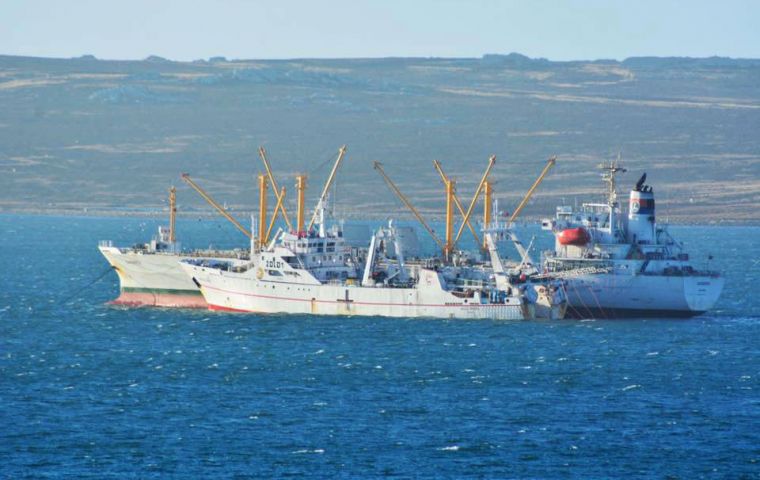MercoPress. South Atlantic News Agency
Falklands' fisheries legislation reform, a view from Galicia
 Enrique Cesar López Veiga titled his article “Storm in the Malvinas?” and recalls he was in charge of negotiating the first fishing licenses with the Falklands
Enrique Cesar López Veiga titled his article “Storm in the Malvinas?” and recalls he was in charge of negotiating the first fishing licenses with the Falklands A former Galician Fisheries Councilor has published a piece in a newspaper closely linked to the industry in the northwest of Spain, El Faro de Vigo, questioning the long term viability of new Falkland Islands' legislation, particularly the concept of Qualifying Companies and the fact that they must be at least 51% property of Falkland Islanders.
Enrique Cesar López Veiga titled his article “Storm in the Malvinas?” and recalls he was in charge of negotiating the first fishing licenses with the Falklands (in a very complicated international scenario) and admits having a special rapport with Islanders, because the “atmosphere was always reasonable and pragmatic”, and the overall agreement has worked in a mutually satisfactory way.
However now Falklands are considering legislative amendments, following on the proposals from New Zealand consultants, which can harm the Islands both economically and politically. The minimum 51% share of fishing companies for Islanders is not aligned with free market rules which are the basic philosophy of the European Union. Although the first reaction to such a proposal seems geared to further benefit the economy of the Falklands, it might hold contrary effects to those pretended.
It is true that Falklands' citizens are the owners of the resource, but of resources that have as only destination, in practical terms, the Spanish market, which belongs to Spanish citizens. So far the Falklands' fisheries have functioned in a reasonable balance but the new legislation means Spanish vessel owners will have to sell some of their most valuable assets, the vessels, which Lopez Veiga added can fish or integrate other joint companies in other areas and rapidly adapt to the situation, and it is possible some are thinking about it.
Further on López Veiga points out, “I recommend the Falklands' authorities to read the magnificent book by M. Porter on ”The competitive edge of nations” (*) where he clearly shows that holding the property of resources does not necessarily mean economic success. All economic development must be accompanied by a raft of all kind of measures which finally conform what Porter describes as a competitive diamond.
“This is a true challenge for the Falklands' authorities since the development of this competitive diamond is going to need abundant private investment, and that at the moment, can only come from Spain and its fishing sector, and it needs in abundance among other things to develop a port, and all the needed infrastructures, which are not few. For this the Falklands' authorities have to spur the interest and attendance of private investors, and this needs a stable legal environment, reasonable and clearly profitable.
”And it doesn't seem this legislation is moving that way, rather in the opposite direction and what seems initially as a good solution could have contrary effects. To this we must add the complication of an international political situation which is not precisely reassuring for the Islands.
“The privileged relation with the Spanish fishing industry has been a considerable help to stabilize that international situation. It also remains to see what can happen if it is decided to negotiate some kind of fisheries agreement with the EU, since that would mean the immediate cancelling of all private accords. Falklands' authorities should meditate about all this and not put to risk a good relation. It does not seem the New Zealand consultants have paid sufficient attention to these complicated issues, but which are real. Falklands' authorities should think carefully about all this” , concludes the Galician fisheries expert.
(*) PORTER, M.- 1990 . The competitive advantage of nations. The Mac Millan Press Ltd. 855 pgs., and PORTER, M.E. (1998) On Competition. Harvard Bussiness Review Books. Boston. 485 pgs. Págs. 187-297




Top Comments
Disclaimer & comment rulesCommenting for this story is now closed.
If you have a Facebook account, become a fan and comment on our Facebook Page!